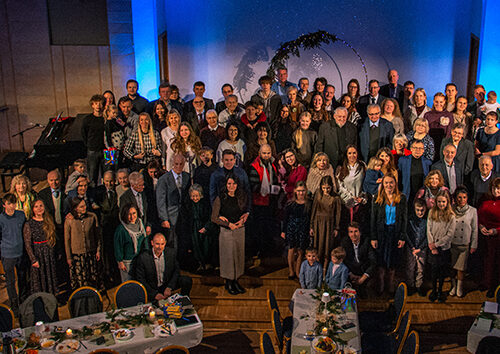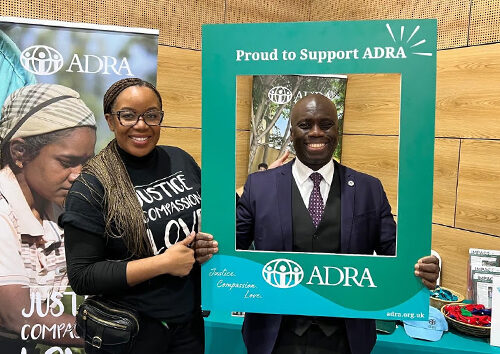28 August 2020 | Tirana, Albania [Rachel Cabose]
Stay-at-home orders during the COVID-19 pandemic have posed hardships for people around the world. But in Albania, the misery was compounded by the fact that many people had no homes to stay in.
An earthquake that struck the country in November 2019 killed 51 people, injured about 3,000 more and destroyed numerous buildings, leaving thousands of families without shelter. When the nationwide lockdown began in March 2020, many of these people were living in tents or shipping containers because their homes were still unsafe and uninhabitable.
![Tefta, a Roma woman, shows her gratitude to ADRA for the tarpaulin she received for her tent after an earthquake hit Albania in November 2019. [Photo: ADRA in Albania] Tefta with tarp](https://ted.adventist.org/sitenews/wp-content/uploads/2020/08/images_news-2020_tefta_with_tarp.jpg) One of the hardest-hit areas was the Kruja region, just north of Albania’s capital city, Tirana. It was here that the Adventist Development and Relief Agency (ADRA) focused its efforts during the pandemic, supporting families who were still reeling from the effects of the earthquake.
One of the hardest-hit areas was the Kruja region, just north of Albania’s capital city, Tirana. It was here that the Adventist Development and Relief Agency (ADRA) focused its efforts during the pandemic, supporting families who were still reeling from the effects of the earthquake.
“These have been difficult months because the communities we work with were found outside living in tents without proper infrastructure and lacking basic living conditions,” says Kristi Qendro, programme director for ADRA in Albania. “ADRA initiated its intervention right after the earthquake in November 2019 and is still working to support families during the COVID-19 pandemic with food and hygiene packages, individual and group counselling, online psychosocial support and supplementary classes for children at risk of dropping out of school.”
Assisting the Most Vulnerable
ADRA in Albania has been implementing educational projects in the affected regions for more than ten years, but its efforts have intensified during this dual crisis. Immediately after the earthquake, ADRA provided emergency supplies to more than 100 families. The aid included tents and other shelter materials, stoves, washing machines, portable toilets, showers and solar water heaters, along with hygiene kits and hot meals. In addition, approximately 3,500 children and adults received psychosocial support through individual counselling sessions, group therapy sessions, excursions and supplementary classes.
“Our intervention specifically targeted the needs of the Roma and Egyptian minorities because these communities are even further marginalised,” says Altin Rexhepi, executive director of ADRA in Albania. “In spite of political rhetoric, providing the Roma and Egyptian communities with humanitarian aid is not considered a priority of the government and state institutions.”
When the pandemic brought additional deprivations, ADRA secured funding to supply 40 Roma and Egyptian families with food packages and hygiene supplies for two months. Thirty more families in the villages of Thumane and Bubq received hygiene materials during this time.
Caring for Troubled Souls
During the pandemic, the need for psychological support deepened, yet the avenues to offer it became limited. ADRA in Albania, in cooperation with the Seventh-day Adventist Church, launched a nationwide phone counselling hotline to assist individuals with mental health needs. Callers could speak with ADRA’s staff psychologists and social workers for personal counselling, while three Seventh-day Adventist pastors were available for those who expressed a spiritual interest.
“We publicised the ADRA helpline through our official website, Facebook and Instagram. Also, the church spread the news among its members,” says Qendro.
Ten college-student volunteers were assigned to call people who had previously received help from ADRA to find out their needs, both physical and emotional, and offer support. These conversations gave ADRA workers the opportunity to uncover developing problems such as child abuse and help the clients deal constructively with them.
Providing Educational Opportunities
Helping children from low-income families obtain a high-quality education is a top priority for ADRA in Albania. Low-income students were especially affected when schools closed during the pandemic. In collaboration with school staff in the Tirana region, ADRA identified children at risk of dropping out of school and provided supplementary instruction to help them understand their online classes better. ADRA worked with a teacher to create explanatory videos and shared the explained video lessons with the children via a WhatsApp group.
In July 2020 ADRA’s Community Centre in the village Bubq was reopened, and a new Community Centre was established in the village of Borizane. The community centres offer classes, group counselling sessions, and recreational activities for children, teens, and adults. As the risks from COVID-19 continue, the centres educate the public on proper protective measures to combat the virus and encourage local residents to care for their physical and mental health. ADRA’s community centres provide a place of cheer and comfort for individuals who are hurting from their losses in the earthquake and pandemic.
A Family Finds Hope
Through all of these projects, ADRA is sharing hope with people such as Ermal,* who lives with his aging parents, his wife and their three children in the village of Bubq. After the earthquake damaged their home, ADRA gave them clothes, blankets, heaters and other supplies they needed to survive the winter living in a tent.
As ADRA workers provided psychological support for the family in the aftermath of the earthquake, they recognised that Ermal suffered from depression and other mental health problems, although he never would have admitted it. Ermal was referred to a psychologist for treatment, while his wife benefitted from group therapy at ADRA’s community centre in Bubq. Two of their daughters, ages 10 and 16, came to the centre for positive, fun activities such as crafts and games that took their minds off the troubles around them. During the COVID-19 shutdown, ADRA offered emotional and spiritual support to the entire family by conducting online consultations on how to cope with the pandemic.
Now that Ermal and his family have completed the necessary documents for the reconstruction of their home, they are looking to the future with greater optimism. ADRA continues to support Albanian communities as they work to recover from a double disaster.
ADRA’s COVID-19 response in Albania is part of its worldwide effort to alleviate the suffering caused by the pandemic. As the global humanitarian arm of the Seventh-day Adventist Church, ADRA is assisting approximately 2.7 million families in more than 70 countries during the pandemic. ADRA’s emergency relief activities include distributing food, hygiene products and cash vouchers to people in need as well as training frontline workers and providing medical supplies to hospitals serving vulnerable communities. To help with ADRA’s ongoing COVID-19 response, visit adra.org.
*Name has been changed for privacy.
_______________________
Used with permission from ADRA Albania
tedNEWS Staff: Victor Hulbert, editor; Deana Stojković, associate editor
119 St Peter’s Street, St Albans, Herts, AL1 3EY, England
E-mail: [email protected]
Website: www.ted.adventist.org
tedNEWS is an information bulletin issued by the communication department of the Seventh-day Adventist Church in the Trans-European Division. Readers are free to republish or share this article with appropriate credit including an active hyperlink to the original article.



